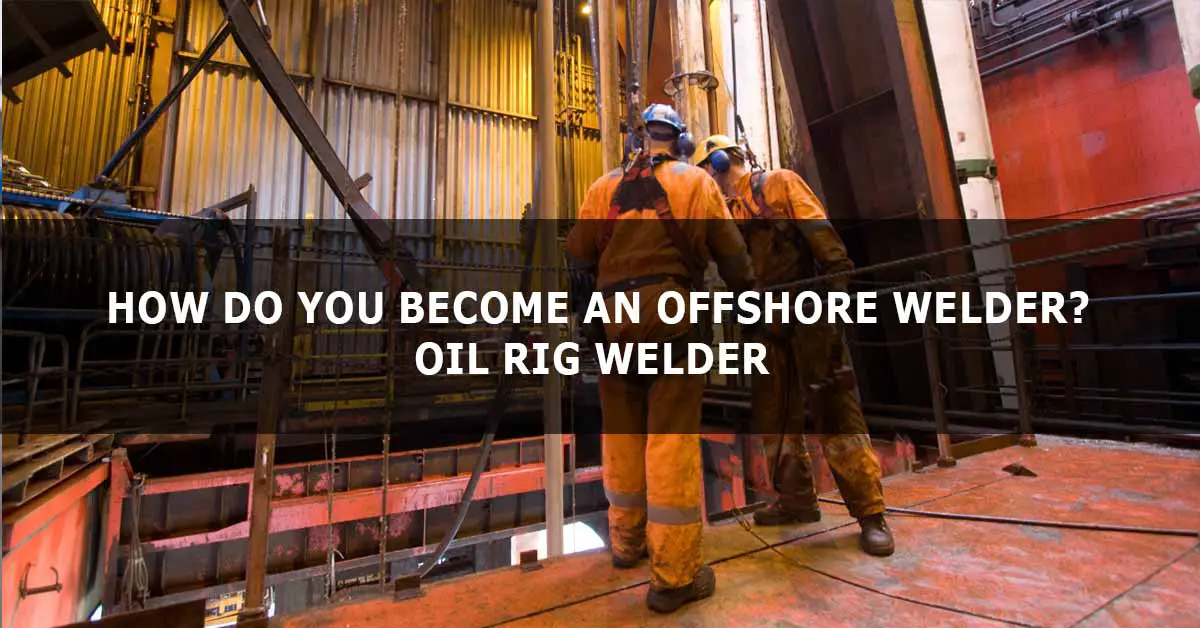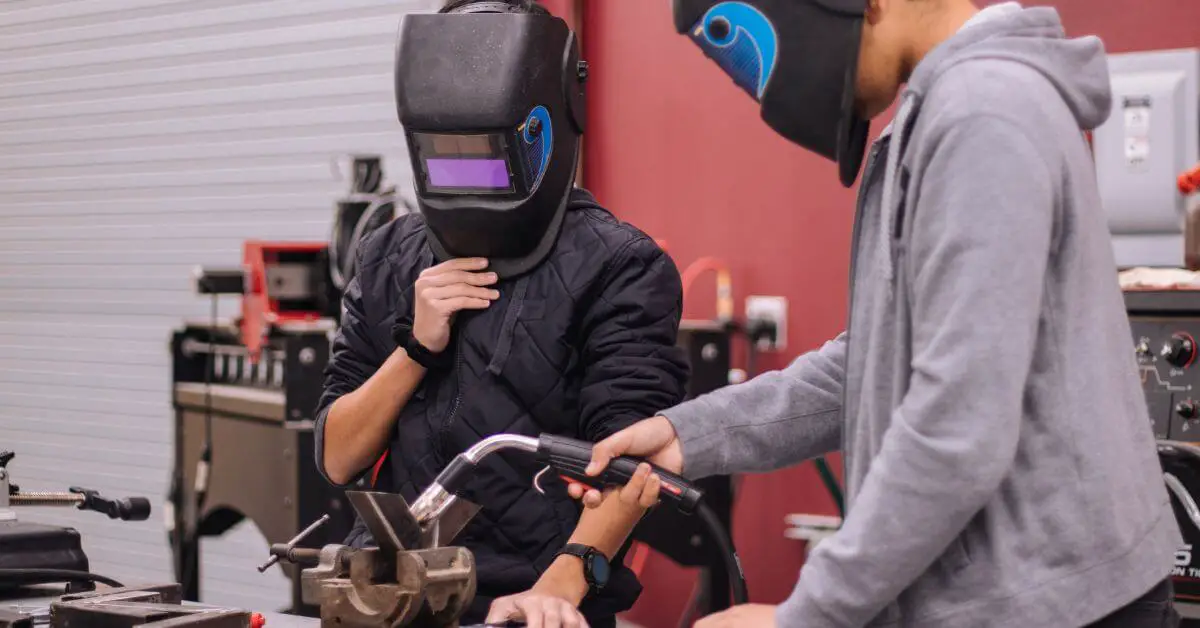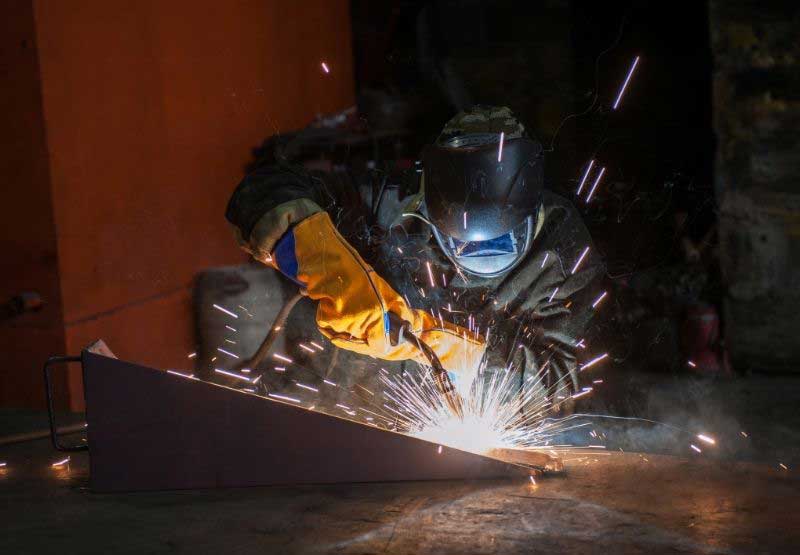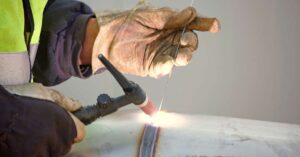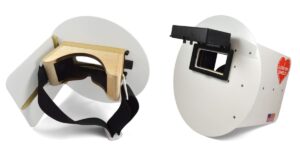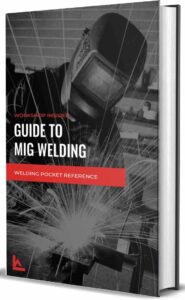Becoming a rig welder requires a unique set of skills and experience. Offshore welders must be physically fit, able to work in challenging conditions and have an excellent understanding of various welding methods and safety protocols.
Aspiring offshore welders need industry knowledge, experience, and certifications to break into this field. They can gain knowledge by pursuing technical education, seeking apprenticeships and entry-level jobs, and networking with professionals already working in the field. Keeping up with industry news is crucial to stay informed on the latest trends and best practices.
In this article, we’ll discuss the requirements, certifications, education, and training needed to pursue a career as an oil rig welder.
What is Oil Rig Welding?
Rig welding is a specific form of welding used in the drilling of crude oil, coal, and gas. This process involves working in extreme weather conditions and significant challenges.
Rig welders must be able to perform their work in harsh conditions, including high winds, rain, and blazing sun. These conditions require strict adherence to safety protocols, including properly using protective gear and equipment.
The role of rig welders in maintaining the structural integrity of a drilling rig cannot be overstated. They must work quickly and efficiently, knowing that any delay in completing their work can increase the risk of damage to the rig and potentially put lives at risk.
What Does a Rig Welder Do?
Rig welders are responsible for welding together metal structures for onshore oil drilling and offshore platforms. This includes pipelines, storage tanks, and drilling rigs. Their work is crucial in maintaining the structural integrity of the drilling rig, which is necessary for safe and efficient drilling operations.
Safety is of utmost importance when working as a rig welder. The welding process poses significant hazards, such as airborne contaminants, toxic fumes, and explosions. The worksite can also be unpredictable, with factors like extreme heat, high winds, and rain.
To ensure everyone’s safety, rig welders must follow strict safety protocols, including using personal protective equipment, practicing safe welding techniques, and working with equipment that meets industry standards.
Apart from welding techniques, a rig welder must possess excellent communication, teamwork, and problem-solving skills. We must be able to read blueprints and drawings, have spatial awareness skills, and have the physical stamina to perform tasks that require extended periods of standing, crouching, or kneeling.

The Lifestyle of Rig Welder
Being a rig welder is not a lifestyle suitable for everyone due to the high-pressure job demands and extended periods away from home and family. Unlike a typical 9-to-5 job, rig welders work on fly-in fly-out arrangements, which means they commute to and from the rig.
The employer usually provides living accommodations, oil rig welders work and live on-site for a designated period before flying or commuting back home for another designated period.
The long hours and days spent away from home can strain relationships, particularly those in committed relationships. Family events may be missed due to work arrangements, causing stress for the rig welder and their significant other.
To maintain expertise, rig welders must keep up with industry standards and welding technology updates, requiring a lot of training and certification courses.
If you’re considering a career in rig welding, be prepared to work hard and learn as much as possible. While the rewards are significant, personally and financially, this job is not for everyone. You must be willing to adapt and thrive in a challenging and unpredictable environment to succeed in this career.
How to Become a Rig Welder? Offshore Oil Rig Welder Job Qualification
To become a rig welder, you must undergo extensive training and certification to acquire the necessary skills. It requires dedication, hard work, and a strong commitment to safety. With the right training, certification, and experience, you can build a successful career in this exciting and challenging field.
Here are some guidelines for the necessary educational and certification requirements:
Educational Requirements
To start a welding career in the rig welding industry, you need to have a minimum qualification of a high school diploma or GED equivalent. However, having an educational background in welding, such as a certification or diploma from a vocational school or community college, can improve your chances of getting hired.
Completing a welding program at a vocational school or community college provides an opportunity to gain valuable knowledge and training in various welding techniques, including metal arc welding, gas tungsten arc welding, flux-cored arc welding, and stick welding.
Another advantage of completing a welding program is the opportunity to earn welding certifications. Welding certifications prove your competency and proficiency in a particular type of welding.
On-the-Job Training and Continuing Education
Rig welding jobs usually require entry-level rig welders to undergo on-the-job training. While the training is not always formal, it is vital to learn the techniques and skills specific to the job.
On-the-job training allows you to gain practical experience welding various materials, including stainless steel and carbon steel.
Continuing education and recertification are critical in the rig welding industry. Rig welders must stay updated on the latest welding techniques and industry standards. The employers require their rig welders to continually keep up with current certifications and developments in the industry continually.
The most cost-effective way to update your skills is by contracting with a rig welding service. The cost of these additional certifications and courses could be significant. However, it is important to contract with a rig welding service.
Top Rig Welder Certifications
One way to improve your job prospects as a rig welder is to obtain certifications in welding. Welding certifications demonstrate proficiency and competency in various welding processes. Here are the top rig welder certifications available today:
1. American Welding Society (AWS) Certified Welder
The AWS Certified Welder certification is a national welding industry standard that covers welding processes such as shielded metal arc welding, gas tungsten arc welding, and flux-cored arc welding. The certification process involves a written exam covering welding theory and assessing welding skills.
2. AWS Certified Welding Inspector (CWI)
The AWS Certified Welding Inspector certification is a comprehensive certification that covers welding inspection, testing, and quality control. The certification process involves a written exam, a vision test, and a practical exam to demonstrate welding inspection skills.
3. AWS Certified Welding Supervisor (CWS)
The AWS Certified Welding Supervisor certification is designed for welding professionals supervising welding operations and ensuring quality standards compliance. The certification process involves a written exam covering welding supervision theory and assessing welding supervisor skills.
4. National Center for Construction Education and Research (NCCER) Welding Certification
The NCCER Welding Certification is a nationally recognized certification that covers welding processes such as shielded metal arc welding, gas tungsten arc welding, and flux-cored arc welding. The certification process involves a written exam covering welding theory and a performance-based assessment of welding skills.
What Type of Welding Do Rig Welders Use
You’ll need a few key welding hard skills to excel as a rig welder. Let’s take a closer look at what those are:
TIG and MIG Welding
The rig welding industry demands high professionalism and excellence in welding. Because of this, rig welders must become proficient in TIG and MIG welding techniques. TIG welding is generally critical for corrosion-resistant alloys, stainless steel, and other non-ferrous metals. In contrast, MIG welding is more efficient for welding basic metal parts and pipeline welding.
Not only are these skills necessary for working on offshore drilling rigs, but they ultimately lead to job security. Rig welding jobs remain in high demand and the more skills you can acquire, the more valuable an asset you become to your employers.
Stick Welding
Rig welders are responsible for welding various metal components to create structures like storage tanks, drilling rigs, and offshore platforms. In many cases, these welding jobs must be performed in tough environmental conditions, such as offshore drilling rigs, where high winds, salt, and other environmental factors complicate the task.
Stick welding is often the preferred method in such circumstances because it can be used in difficult environments to create strong, reliable welds. It is considered the most versatile and simple welding technique as it doesn’t require any special welding equipment, and welders can perform it under any environmental condition.
Flux Cored Arc Welding (FCAW)
FCAW is a cost-effective welding process that offers several benefits in rig welding. It provides better flexibility because it can be used on a wide range of metals and alloys and is suitable for welding thick plates and long joints. FCAW requires less equipment (Gas Cylinders) than welding processes like GMAW.
One of the advantages of FCAW is that it can produce high-quality welds with excellent penetration and low spatter. This means that the time required for post-welding cleanup is reduced.
Benefits to Become an Oil Rig Welder
Becoming an offshore welder can be a lucrative and fulfilling career choice. Offshore welding jobs require unique skills and offer a unique work experience that sets them apart from other welding jobs. Here are some of the benefits of becoming a rig welder:
1. Job Security: One major benefit of becoming an offshore welder is job security. The oil and gas industry has a high demand for rig welders, and this trend is expected to continue in the coming years. The offshore drilling industry is expanding, and many rig welders are needed to work on the large structures used in drilling operations.
2. High Salary: Rig welders are among the highest-paid welding professionals due to the demanding nature of the job and the importance of safety in the offshore drilling industry.
3. Safe Working Environment: The offshore drilling industry is highly regulated, and strict safety protocols are in place to ensure the safety of workers. Welders must undergo extensive safety training to work on offshore drilling rigs and always wear protective gear while on the job.
4. Travel Opportunities: Welders are often required to work on rigs located in remote areas or international waters, allowing them to see parts of the world they may not otherwise get to experience.
5. Personal Development: Working as an offshore welder provides a thrilling and gratifying experience. The job demands a high level of expertise and proficiency in welding and the ability to work under pressure in a fast-paced environment.
However, there are also some challenges to consider:
1. Difficult for Entry-Level: Offshore welding jobs require extensive training and experience, making it difficult for entry-level welders to break into the industry. They might have to complete a trade school or apprenticeship program before being hired for an offshore welding job.
2. Log Time at Sea: Another potential drawback of working as an offshore welder is the extended periods spent at sea. While some welders may appreciate the chance to travel, others may find it challenging to be away from home for long periods.
3. Communication Skills are Must: Having strong communication skills is crucial. Effective communication is necessary to work efficiently with the rest of the crew and to ensure that all work complies with industry standards and is done safely.
Rig Welder Salary
Rig welders can command high salaries due to the demanding nature of the job and the importance of safety in offshore drilling operations. They are among the highest-paid welding professionals, with salaries ranging from around $60,000 to $100,000 annually.
According to the U.S. Bureau of Labor Statistics, the median annual wage for welders, cutters, solderers, and brazers was $47,010 as of May 2021.
Indeed website reports that the average salary for an offshore welder is $70,848 per year in the United States. However, this figure varies widely depending on experience, industry, company, and job location.
Conclusion
Pursuing a career in rig welding can be lucrative and rewarding. While the job can be demanding and require extended periods away from home, it offers excitement and a chance to contribute significantly to the energy industry.
As long as one is committed to safety, continuous learning, and professional growth, a career in rig welding can be both fulfilling and financially rewarding.

